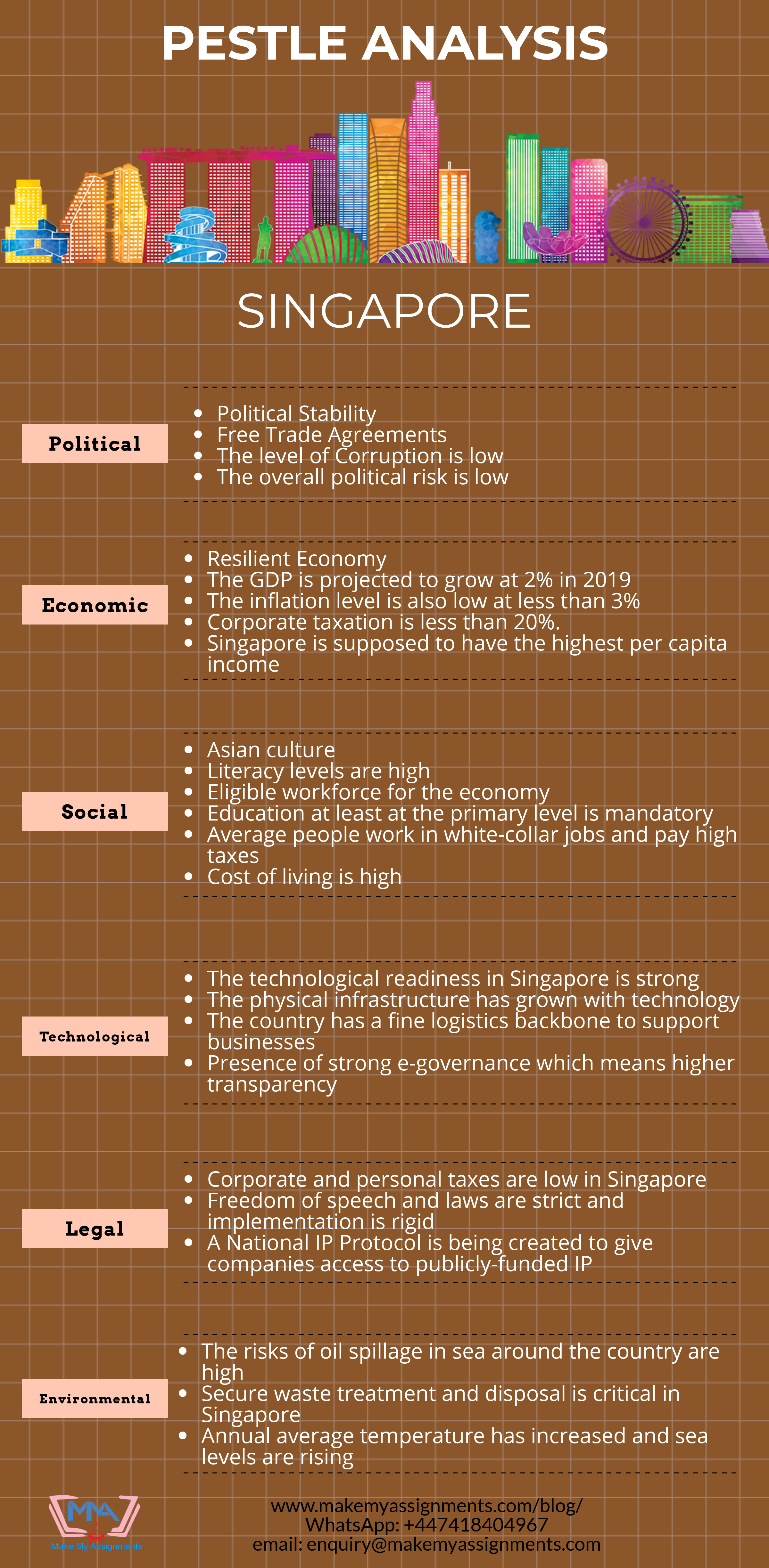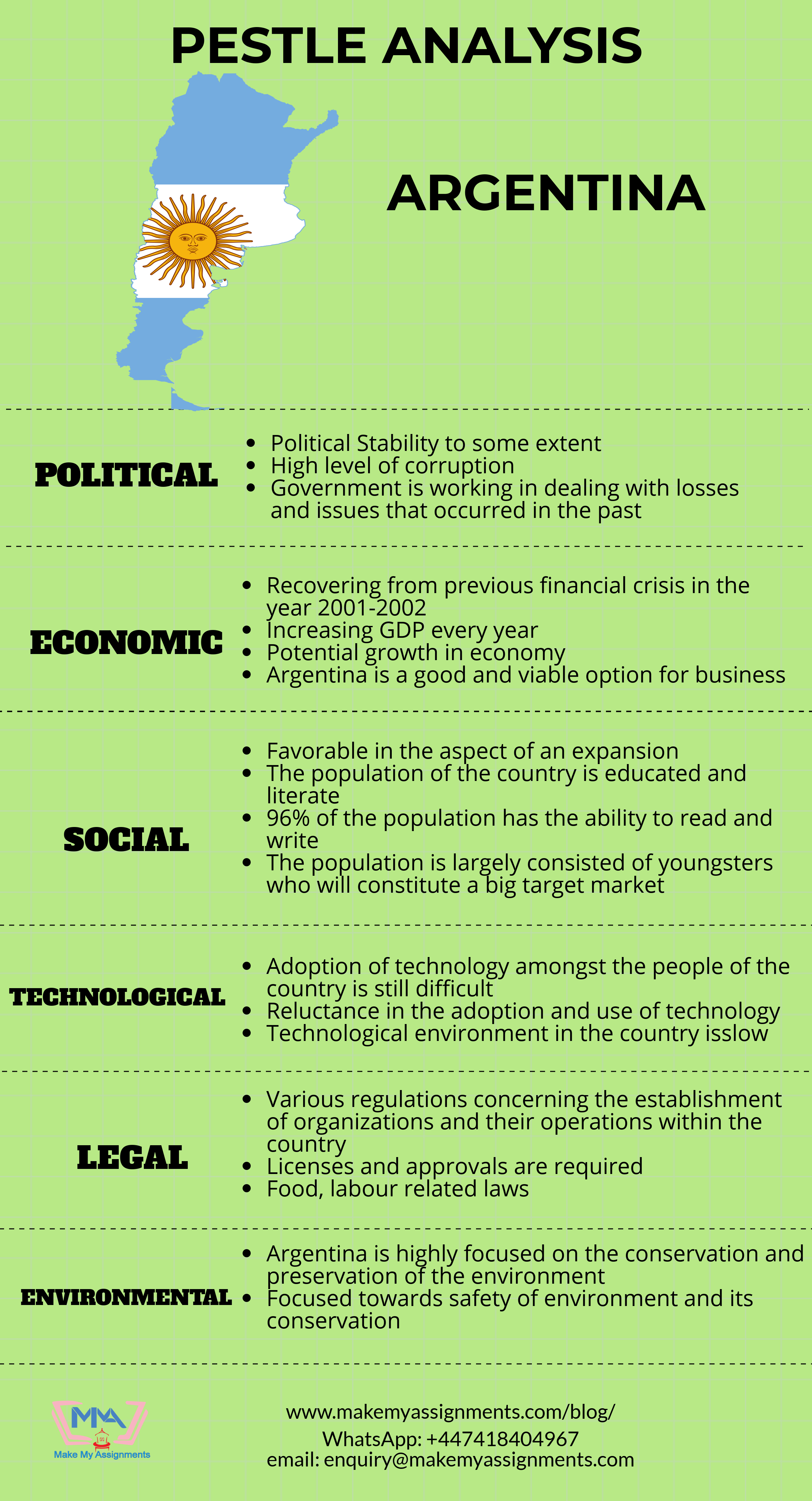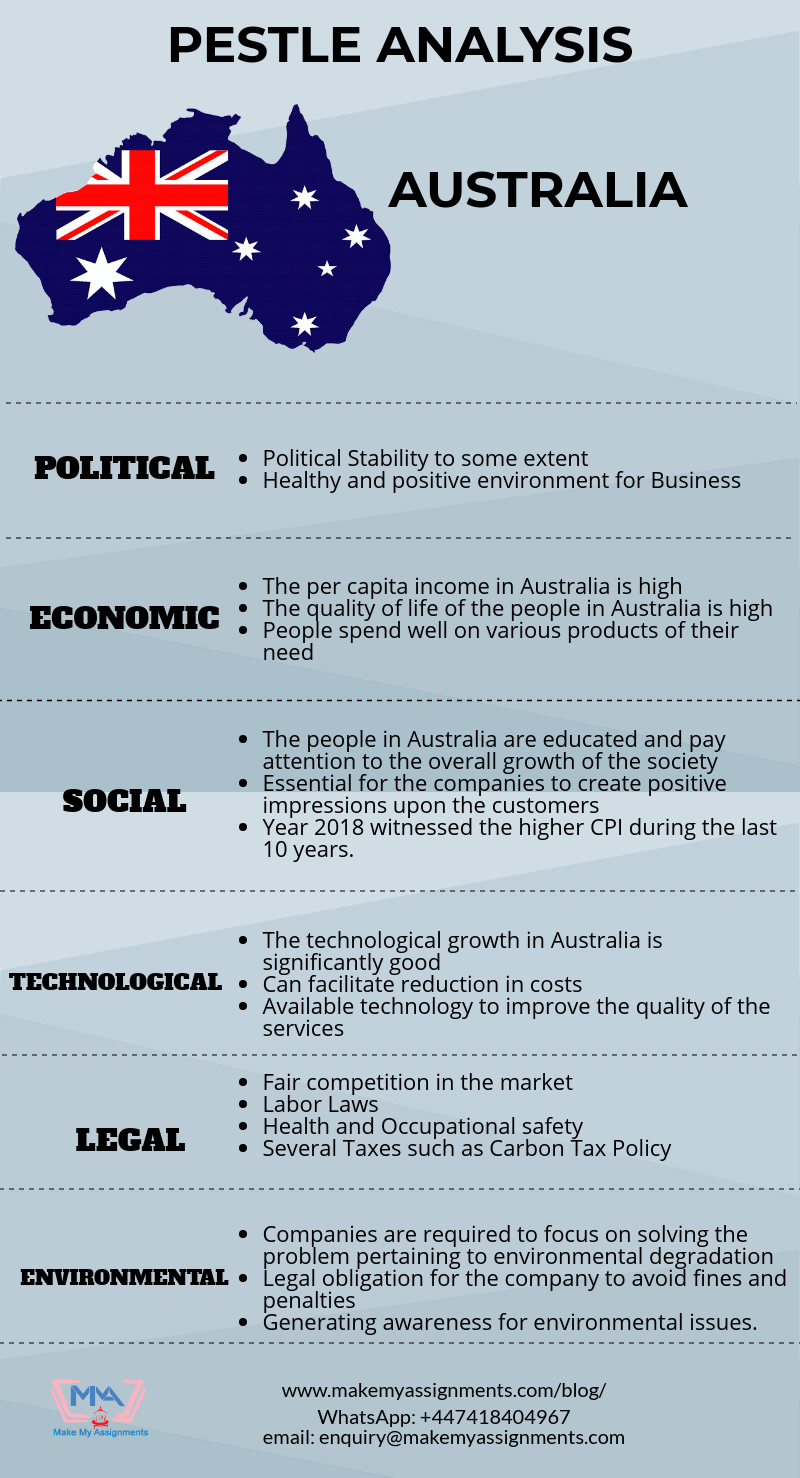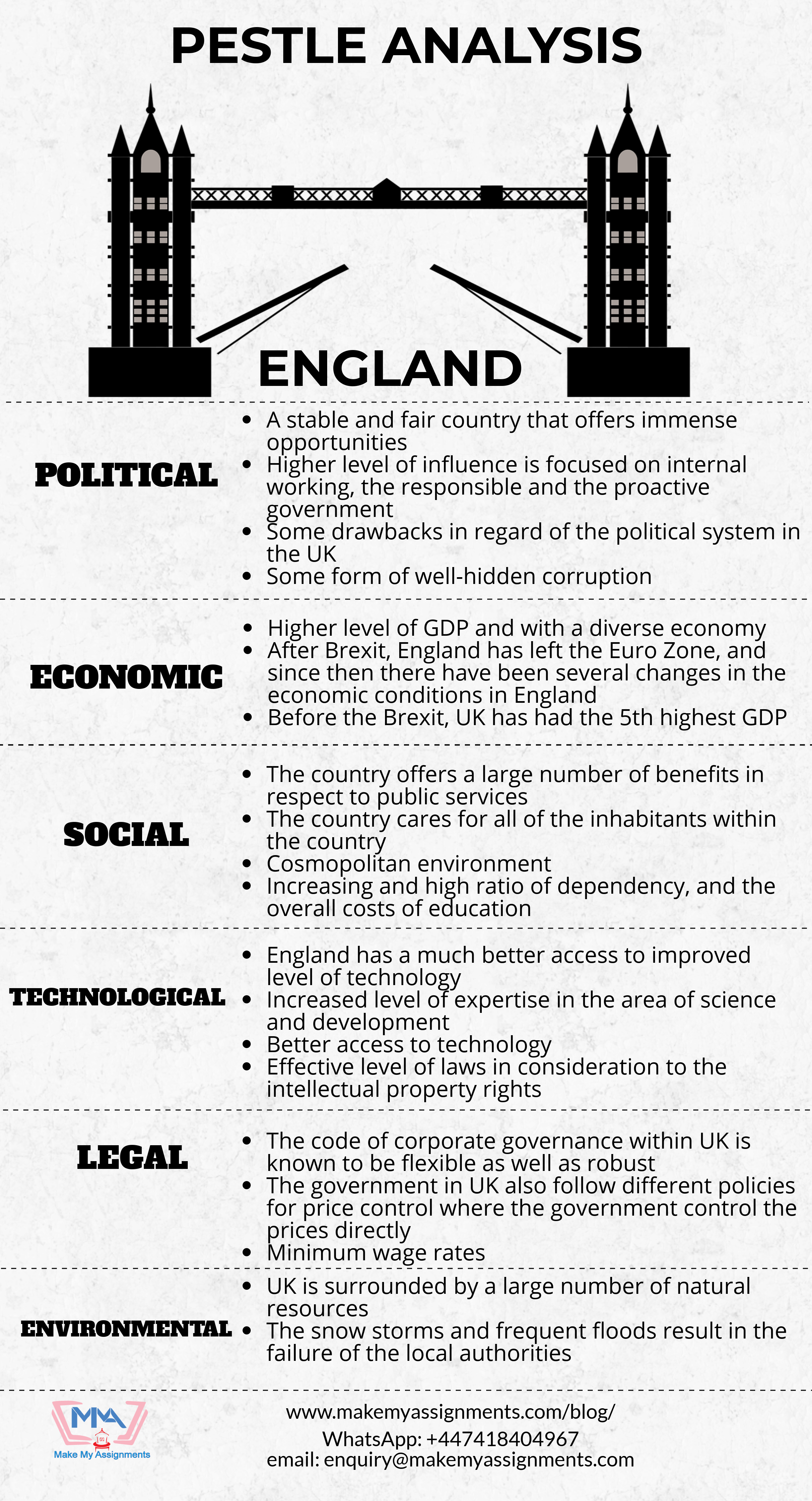
4 Best And Practical PESTLE Analysis Examples You Must Know- PESTLE Analysis of a Country
This post shares some of the key PESTLE Analysis Examples which you can use to score good grades in your marketing assignment in your universities. The PESTLE analysis is actually the external environment of a company which actually the environment of the country in which the company is operating. Marketing Assignment help is one of our prime assignment help service and while making marketing assignments, we are often asked to write PESTLE analysis of different countries which can help you to make your marketing assignment effectively. The countries that we have covered in this article are provided below.
1. PESTLE Analysis Example: Singapore
This section provides the first of the four Pestle analysis examples where an evaluation of the PESTLE analysis of Singapore has been undertaken. Singapore is known as an island city-state which off to the southern Malaysia. Singapore is referred to as a global financial center with a tropical climate as well as the multicultural population.
Now let us evaluate the overall business environment of Singapore by using a Pestle analysis example. The following infographic provides an overview of the PESTLE analysis of Singapore:
1.1. Political Factor
The political form of Singapore is termed as parliamentary democracy. The leading political party in power since more than 50 years is People’s Action Party. This indicates clear political stability. The government is investment – friendly which is further confirmed by the economic resurgence programmes designed and implemented by them. They are part of many Free Trade Agreements which helps companies from different countries to setup investments easily in Singapore. But the economy is bureaucratic and stringently procedural. This could also be a reason that there is stability with continuous delivery of results. The level of corruption is low. A Transparency International Report titled Corruptions Perception Index of 2013 ranks Singapore at no. 6 with no. 1 being the cleanest country in terms of corruption. Thus, political risk is low.
1.2.Economic Factor
Singaporean economy is one of the resilient ones in the Asian continent though there has been some slowdown which can be attributed to global cascading effect. The service sector like most of the other developed economies is largely dominant in this country. The GDP is projected to grow at 2% in 2019. The Industry Transformation Programme is a step in modernizing 20 industries including food. The program’s purpose is to drive the country to the next level of economic development. The rate of unemployment is low at around 2.2%. The inflation level is also low at less than 3% which is good for business investments. Corporate taxation is less than 20%. Singapore is supposed to have the highest per capita income in all the ASEAN nations. Thus, economic favourability is high.
1.3. Social Factor
The Singaporean society is steeped in Asian culture where family and community gain precedence over individualism. Literacy levels are high (95%+) and much of the population belongs to the 15 – 65 years age group that is providing the eligible workforce for the economy. There are people from many other Asian countries settled in Singapore and proactively contributing to the economy. Education at least at the primary level is mandatory. Because the population consists of Chinese and Indians; the students in higher education levels are also equally substantial. Average people work in white-collar jobs and pay high taxes for a clean economy. Cost of living is high hence people residing in Singapore are economically stable and strong.
The government has initiated a Quality Growth Programme to drive growth through productivity gains and reskilling people to help the industries add more value with newer technology and processes. One of the programs is food manufacturing skills framework. Hence, the government and the social fabric is pro-growth, pro-development and has the depth to provide skilled workforce for industries as well as strong market to consume products.
1.4. Technological Factor
The technological readiness in Singapore is strong. A Bloomberg – PwC study has rated technology readiness between 160 – 180 points compared to less than 100 points in 2014. The fact that the country is an important financial center other than New York and London speaks of its infrastructural stability and evolution. The physical infrastructure has grown with technology and the country has a fine logistics backbone to support businesses. The financial services sector is a major contributor to the country’s GDP. Even the 2019 Budget proposed that government will aid companies to invest and add to their digital capabilities.
Another statistic highlighting Singapore’s technology status is World Economic Forum’s Report on Networked Readiness Index 2016 which ranks the country at No. 1 out of 139 economies. This index was measuring “how economies use the opportunities offered by ICT for increased competitiveness and well-being”. The readiness indicates the presence of strong e-governance which means higher transparency. This is beneficial for businesses as in such cases corruption is usually low and ease of doing business is higher.
1.5. Legal Factor
Corporate and personal taxes are low in Singapore but the amenities provided to citizens are high. There are some issues with freedom of speech and laws are strict and implementation is rigid. This could be one reason why the economy is cleaner compared to other countries and community is largely peaceful.
One of the measures under the Industry Transformation Maps presented in Budget 2019, the government has planned for “forward-looking regulatory regime”. Land zoning regulations will be revisited and revamped to enable businesses to work with both manufacturing and service models to create more value and enhance business prospects. A National IP Protocol is being created to give companies access to publicly-funded IP. The implementation of Singapore Centres are aimed to help foreign businesses understand the procedure to setup business in the country and operate comfortably. All these present positive signals for companies to invest in the country.
1.6. Environmental Factor
Being a small country with sea around, environment safety and ecological stability is a prime concern for good quality of life in Singapore. Tourism is a big business for the economy and environment plays a key role in maintaining the attraction of the country for tourists. The risks of oil spillage in sea around the country are high and therefore marine life preservation is a priority. Secure waste treatment and disposal is critical in Singapore and norms are strict.
A government body of Singapore – National Climate Change Secretariat has already pointed that annual average temperature has increased and sea levels are rising. Thus, any business intending to setup in Singapore must ensure a strong environmental sustainability plan in place to have a forward-looking view and direction.
Conclusion
The overall PESTLE Analysis Example of Singapore provides that country offers diverse opportunities for business and the firms can operate effectively within this environment while ensuring to meet the needs and the laws of the country.
2.0 PESTLE Analysis Example- Argentina
This section provides the second of the four Pestle analysis examples. Like many developing countries across the world, Argentina is one of the sought after economies in the world where many countries have been expanding their operations. The growth of economy in Argentina has been favourable which is why many companies have been establishing their operations in the country and targeting the customers living there. Following infographic provides an overview of the PESTLE analysis of Argentina.
2.1. Political Factor
The political environment refers to the impact of government policies and operations within the country that are capable of impacting the organization. Argentina has faced several political issues and struggles in the past because of a high level of corruption amongst people in power and in public authorities. But at the present moment, the country is growing and many companies are investing in establishing their operations within the country. The previous losses and issues are being dealt with by the government to make Argentina a better and flourished economy.
2.2. Economic Factor
In economic terms, Argentina is one of the countries that has been recovering from previous financial crisis in the year 2001-2002. Though, ever since the crisis, the country has been able to achieve an increasing GDP every year and is currently one of the most sought countries by many companies from USA and other locations because of the potential of growth the its economy has. Hence, in economic terms, Argentina is a good and viable option for any company to expand its operations in.
2.3. Social Factor
The social factors in Argentina are also favourable in the aspect of an expansion because of several reasons. Firstly, the per capita income of the people living in the country is high which means they have good resources to spend in the market. Secondly, the population of the country is educated and literate. Rather, it has one of the highest literacy rates in the world where 96% of the population has the ability to read and write which means the workforce of the country is well-educated. Thirdly, as mentioned above, the population is largely consisted of youngsters who will constitute a big target market for a company.
2.4. Technological Factor
The technological environment can be a troublesome cause for a firm to consider for its expansion in Argentina because the adoption of technology amongst the people of the country is still difficult and their reluctance in the adoption and use of technology has made the growth of the technological environment in the country slow.
2.5. Legal Factor
The legal environment refers to the rules, regulations and policies that have been put in place for people and organizations to follow and there are various such regulations concerning the establishment of organizations and their operations within the country, licenses and approvals that are required to be taken before starting the business, standards that are required to be followed while serving food, labour related laws, etc. that will all be required to be followed by a company if its expands its business in Argentina.
2.6.Environmental Factor
Similar to the rest of the world, Argentina is highly focused on the conservation and preservation of the environment which is why the Ministry of Public Health and Environment makes and implements several rules as well as plans that are pointed towards the safety of environment and its conservation which also impacts business organizations.
Conclusion:
The PESTLE Analysis Example of Argentina provides that though the political environment is a bit unstable and the economy is trying its best to meet the needs of the residents, operating in Argentina would be fruitful for any company to some extent.
3.0. PESTLE Analysis Example: Australia
This section provides the third of the four Pestle analysis examples. Australia, officially known as the Commonwealth of Australia is a sovereign country which comprise the mainland of the Australian Continent, the island of Tasmania and several small islands. It is known to be the largest country within the Oceania and the sixth largest country in the world on the basis of its total area.
PESTLE Analysis Example of Australia is as follows:
3.1.Political Factor
The political factors refer to the government and its affairs within a country which can impact the operations of organizations through the various policies made by governments from time to time that have a direct impact on the taxes to be paid by the companies, the licenses that may be required to be obtained, etc. The government in Australia is stable and provides a healthy and positive environment for organizations to operate their businesses in.
3.2.Economic Factor
The economic factors refer to the GDP ratio in the economy of a country/market that define the paying capacities of the people in that country which consequently impacts the revenue of the organizations. The per capita income in Australia is high and so is the overall GDP as compared to many other popular cities and countries in the world. The quality of life of the people in Australia is high and they spend well on various products of their need. In the year 2017, the GDP in Australia turned out to be 1323.42 billion USD. The GDP per capita during the past 10 years has been constantly increasing and the year 2017 witnessed the higher GDP.
3.3.Social Factor
Social factors concern the customers in the market and the concerns, values, practices and beliefs of the people within a society are capable of impacting the revenue earned by an organization as well as its overall growth in the market. The people in Australia are educated and pay attention to the overall growth of the society which is why concerns like exploitation of resources by companies are highly focused upon. The firms will have to pay attention to such concerns, to their corporate social responsibility, etc. to create positive impressions upon the customers. The consumer price index (CPI) has also been evaluated and it has been seen that the year 2018 witnessed the higher CPI during the last 10 years.
3.4.Technological Factor
Technological factors refer to the growth of technology in a market that may be essential to be used in the various processes and operations of an organization through which products and services are improved and provided to the customers. The technological growth in Australia is significantly good which means that companies can make use of such technology to not only maintain and improve the quality of their services (such as using eco-friendly refrigeration technology to store products), but also to reduce their costs of operation.
3.5.Legal Factor
Legal factors refer to the various laws and regulations that may be required to be followed by organizations and their strictness impacts the operations or the organizations. There are various laws in Australia that will impact companies and will be required to be followed by the company while operating in the country such as policies regarding fair competition in the market, paying proper wages to the employees and workers as well as providing them proper working conditions, payment of several taxes such as those paid under the Carbon Tax policy, etc.
3.6.Environmental Factor
Since the problems of environment degradation are highly discussed and shown concern about in the present day, there are strict policies and regulations that will be necessary to be followed by companies in Australia. This will not only be a legal obligation for the company to avoid fines and penalties but also will be essential to maintain their reputation amongst the consumers who are becoming increasingly aware of the environment issues
Conclusion:
The PESTLE Analysis Example of Australia provides that the Australian market is flourishing and the Australian economy is promising. Thus, if a firm is operating in the Australian Market or is willing to expand its operations in Australia, the company would have bright chances.
4.0. PESTLE Analysis Example: England
This section provides the fourth of the four Pestle Analysis Example. England is a country within the British Isles bordering the Wales and Scotland. The country is also a multicultural, modern hub for business and arts. Following infographic provides an evaluation of the PESTLE Analysis Example of England:
4.1.Political Factor
The England is referred to as a constitutional monarchy that runs on the basis of the parliamentary system. The England is considered as a stable and fair country that offers immense opportunities for all those that are operating in the country. However, it doesn’t mean that the country doesn’t face any hardships. Some of the major positive factors that make the country effective and attractive are its fairness where the higher level of influence is focused on internal working, the responsible and the proactive government that is always ready to ensure that the country should not have to face any hardships and the banes of the society such as corruption and terrorism. The country takes care of all the aspects in a critical manner. The political departments in the country are split into local and national administration and the decisions were taken at the individual level in the way of ensuring the benefits to the society. However, there have been some drawbacks in regard of the political system in UK. There has been some form of well-hidden corruption which has brought the government to worry about. Furthermore, recently there have had been a political issue where England has been bifurcated from the Euro Zone (brexit).
4.2.Economic Factor
Economic position of England is referred to as one of the strongest economies all around the globe. The country operates with a higher level of GDP and with a diverse economy. However, prior to six months, the economy was stable and the overall relationship of the country had been efficient and effective. Most of the funding for the research in UK is procured from the European nations. Recently after Brexit, England has left the Euro Zone, and since then there have been several changes in the economic conditions in England. The currency of England, that is Pound is only acceptable within England only. Despite being a part of the Euro zone earlier, GBP or Pound could have not been used in any of the member nations of EU. The point at which it was decided that England will not be a part of European Nations anymore, the price of Pound in the international market was reduced by 20% instantly and still the price of GBP is 15% below than the previous rates. This has made the imports costlier and the exports cheaper. The overall fluctuations in the exchange rate have made the overall services a bit volatile.
Still before the Brexit, UK has had the 5th highest GDP all around the globe, and had been ranking at the 2nd position within Europe. The overall population in UK is large enough, that even the small markets will be profitable. The economy is diversified within the public as well as the private sector. The market is free and is focused on increasing the foreign direct investment. There were some drawbacks as well, where there had been slow recovery after the recession of 2008/2009. Most of the revenue that is generated by the government is used in the area of social welfare of the people in regard of financial aid, and free public services including for the migrants.
4.3.Social Factor
Social factors are considered to be the important factors within the PESTLE Analysis. The social factors help to determine the ability of the government to ensure that how well the communities and the society are grouped together, and what is the overall environment that is prevailing in the country in respect to its residents. England is one of the top rated countries that operates with high social standards and ensures all-round circumstances.
The country offers a large number of benefits in respect to public services. The country cares for all of the inhabitants within the country. The major aspect is that the country is densely populated. England is open for migration which leads to the achievement of a cosmopolitan environment where 1 out of the 8 residents has been born in a foreign country. This has helped the country to attract a large as well as a cheaper workforce. Last but not the least, the standard of living in England is high. Some of the challenging aspects within England include the increasing and high ratio of dependency, and the overall costs of education is ever increasing. Furthermore, after the Brexit, the situation is getting worse because previously the students from other countries within the European zone used to come in England for research purposes where the universities used to fund their researches which used to facilitate the flow of Euro currency in UK.
4.4. Technological Factor
The technological factors of a country help to identify the overall development within the country. Being a more economically developed country, England has a much better access to improved level of technology. The most important factor for this access to technology is that people from other countries have migrated to England along with their talent and skills. The quality innovation skills with the increased level of expertise in the area of science and development help the country to get better access to technology. Furthermore, there has been effective level of laws in consideration to the intellectual property rights that ensures that the patents and the authority of the innovative technology remains with the country only and it cannot be imitated easily. Last but not the least, there is plenty of competition which stimulates growth.
4.5. Legal factor
The code of corporate governance within UK is known to be flexible as well as robust. The country makes use of an approach that is principle based where it requires the companies to make use of such codes. However, in case if the companies are unable to follow the set goals, then the company will be required to give a valid reason within their financial statements that has to be certified by an auditor. This robust code was enacted when there had been the liquidation of several industries in the financial sectors which resulted in economic crisis.
The government in UK also follow different policies for price control where the government control the prices directly or with the use of regulatory bodies which have the permanent powers for price control over most of the public utilities that are likely to discourage any form of monopoly and also facilitate fair and free competition that allows several new and private firms as well as the public firms to set up.
The minimum wage rates have also been set by the government where an employer is allowed to legally pay an employee. The minimum wage rate set by the government for the employee that are aged 21 years or above, is GBP 6 per hour, whereas workers who are aged between 16 years to 17 years will be paid GBP 3.8 per hour, and the people who are aged between 18 years to 20 years is GBP 5.
4.6. Environmental Factor
The physical environment is considered to be an important variable for the firms that are operating in a provided national market, and considers that how the physical environment is treated and what impact it has over the performance of the business. Though UK is surrounded by a large number of natural resources, but still the country is prone to several different natural disasters such as earthquakes, hurricanes, fires in forest, etc. Furthermore, the snow storms and frequent floods result in the failure of the local authorities to be able to effectively manage the business environment and generally it experiences deteriorating sales.
Overall, in this PESTLE analysis example, it is evident the overall business environment of UK is favorable and can be effectively approached by a business if trying to enter into the UK market.
So here, all the PESTLE analysis examples of different countries have been compiled and we believe that these sample pestle analyses were informative for you. We would be publishing more PESTLE analysis examples of the companies as well in future which would help in guiding you in a better manner. If you are looking for a custom assignment help with PESTLE analysis of any country or a company, you can connect with us anytime. Our expert assignment writers will help you to attain the best possible grades.






